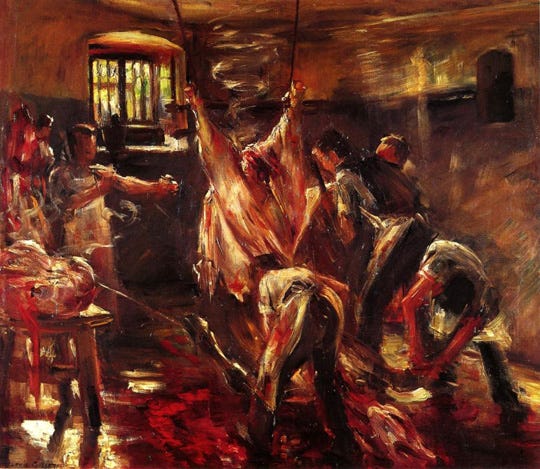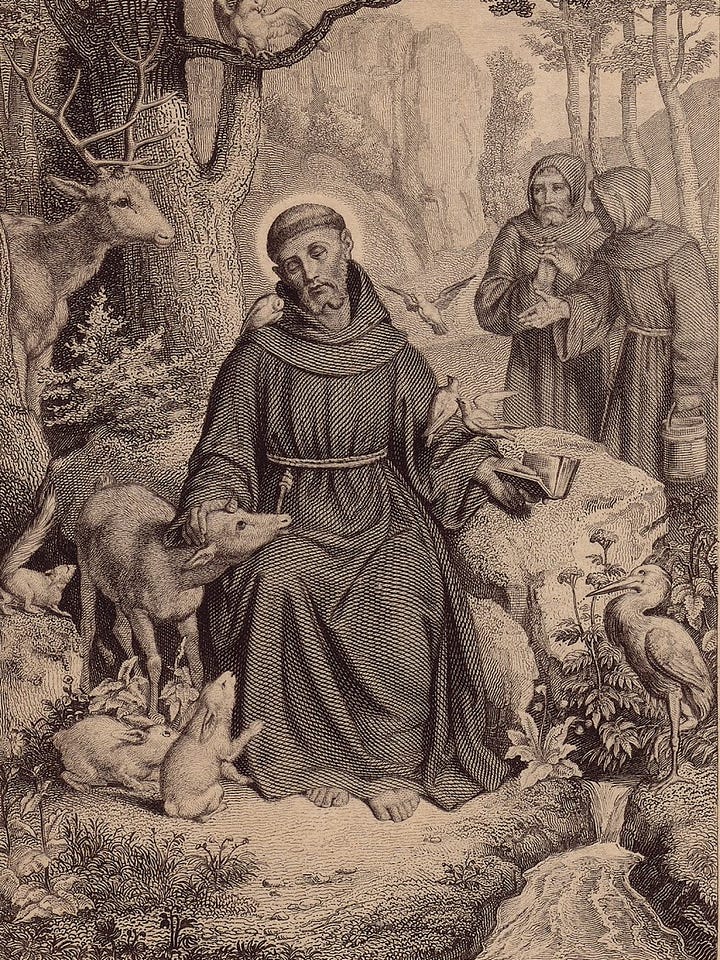

***
“Take no part in the unfruitful works of darkness, but instead expose them. For it is a shame even to speak of the things that they do in secret; but when anything is exposed by the light it becomes visible, for anything that becomes visible is light.” — Ephesians 5:11-13
***
Every year, over seventy-three billion animals are slaughtered so that humans can consume their flesh. This includes hundreds of millions of cows, goats, and sheep, over one billion pigs, and a staggering seventy billion chickens. The vast majority of these animals are reared, housed, and eventually slaughtered in factory farms: large, mechanized torture centers where doomed creatures are kept in conditions the mere description of which would turn most readers’ stomachs. Suffice it to say that the clipping of beaks, the cutting-off of tails, and the grinding-up of millions of still-living chicks are only some of the choice torments inflicted in these nightmarish places.
Confronted with such facts, the proper reaction is something like a mix of horror and remorse, coupled with a deep conviction to contribute in whatever way one can to permanent cessation of such practices. Of course, ours being a fallen species, our reactions are so seldom the proper ones, and thus, despite widespread awareness of the abominable conditions endured on factory farms, the vast majority of well-off Westerners continue to enjoy the flesh, milk, and eggs of the animals tortured there. I am not terribly surprised by this; as I say, we are a fallen species, and I am in no position to judge, being guilty myself of a thousand sins a day. However, I must admit that I am taken aback by the continued prevalence of horrific animal abuse in a nation where nearly two-thirds of the population identifies as Christian.
I would not be so perplexed by this state of affairs were it not for the fact that Christianity has historically been an undeniably potent force for social change.1 After all, it was Christians who made charity the highest of all virtues, ushering in a revolution in social morality the likes of which had never been seen;2 it was they who contributed more than anyone else to the end of such barbaric Roman practices as infant exposure, gladiatorial combat, polygamous marriage, and the widespread cultural acceptance of child sexual abuse.3 It was a Christian bishop and Saint who became the first person in recorded history to call for the complete abolition of slavery,4 and it was Christian sentiments which would later re-emerge to form the core of the European and American abolitionist movements.5 In our own time, the pro-life movement which ceaselessly combats the scourge of abortion is made up primarily—though certainly not entirely—of Catholics and Evangelical Protestants. It would therefore seem only natural for the opposition to the widespread torment and mutilation of animals to be led primarily by Christians. But alas, this is not so.
I cannot stress enough the scale of the moral depravity which takes place on factory farms. As philosopher Michael Huemer has noted, “in just two years, the meat industry slaughters more animals than the total number of human beings who have ever existed. […] It may be that a few years of factory farming causes more suffering than all the suffering in human history” (2018, 82). For Christians to stand idly by and allow such practices to continue unopposed is a complete abdication of our God-given duties.
“But Christ and his apostles ate fish (John 21:13).” Indeed they did. But they also lived in a time and place where factory farms were but a glint in Satan’s eye, and where fishing was essential for the survival and flourishing of the Palestinian peasantry. “But Peter was commanded to ‘kill and eat’ (Acts 10:13).” True enough; but he was not commanded to forcibly breed animals, pen them up in cages, make them live in their own feces, smother them with ammonia, cut off their tails, clip their beaks, and slit their throats without the slightest hint of solemnity. “But Christ declared all food clean (Mark 7:19).” He also told us to pay our taxes (Matthew 22:15-22), but we do not take this as a divine sanction of any and all horrors that our governments might carry out. Likewise, the statement that no food is intrinsically defiling is hardly a license to torture animals for our own convenience. One need not think that the consumption of meat is intrinsically impermissible (I certainly do not think so) in order to oppose factory farming.
Let us hear no more of the dreadful defenses of animal abuse which are sometimes spewed forth from the less respectable quarters of American Thomism. The claim which rests at their core—that because non-rational animals lack rights, their suffering is therefore morally irrelevant6—strikes me as almost trivially false. As David Oderberg put it, “we must stop thinking that only by violating a right can we be cruel, malicious, avaricious, conceited, vainglorious, envious and plain degrading… each case of the use of animals must be assessed on its merits, with due attention to whether what it is aimed at is cruel, degrading, or otherwise set against the virtuous life that human beings are duty-bound to live. […] If a return to this sort of attitude meant that 99 per cent of animal experiments were discarded, then so be it. If it meant that women did not parade around in fur coats (unless they lived in Siberia or Alaska) so be it. […] If it meant a return to organic farming and the end of mass production lines for inedible second-rate food, so be it” (2000, 142-143).
This matter is not complex: every year, tens of billions of God’s creatures are maimed and mutilated, tortured and slain, all for the sake of trivial human pleasures. If we cannot bring ourselves to recognize the wrong being done, and to do something—anything—to stop it, then we are indeed a sinful generation.
For a useful overview, see Christianity and Freedom: Volume 1, Historical Perspectives, edited by Timothy Samuel Shah and Allen D. Hertzke. Cambridge: Cambridge University Press, 2016.
See Ehrman, The Triumph of Christianity. New York, NY: Simon & Schuster, 2018.
See Hurtado, Destroyer of the gods: Early Christian Distinctiveness in the Roman World. Waco, TX: Baylor University Press, 2017.
See Hart, “The ‘Whole Humanity’: Gregory of Nyssa's Critique of Slavery in Light of His Eschatology.” Scottish Journal of Theology, 54, no. 1 (2001): 51-69.




Great post. The animal welfare movement needs the support of Christians, and this is what I will be sharing with my Christian friends as an introduction.
Great article, brother! 👏